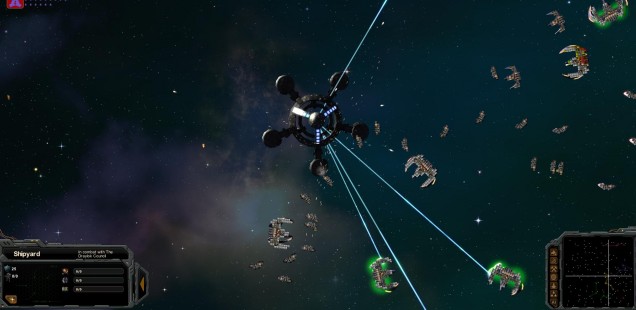
Off The Grid: Stardrive
After a satisfying smack of sound and a blip of light, scouts fling outwards to uncharted star systems and freighters move goods and people to new colonies. Stardrive, though not quite turnbased, is a galactic strategy game that still holds itself to 4X standards, if a bit liberally. Once a planetary network is established by your ships, micromanagement concerns like economy are mostly automated, leaving you to adjust the tax rates and individual production sliders of each planet.
Although streamlined, Stardrive is unhelpful in getting new players on their feet, refusing to hint at any kind of strategy or even basic functionalities. Answers to fundamental questions, like how to establish trade routes for your ships, have to be dug up on message boards, Zero Sum Games still failing, as they have since beta, to add essential tooltips that would be expected in any kind of software, videogame or otherwise. A barren interface can bring an exciting game to a standstill when it turns into a frantic search for clues on how to perform simple actions.
Stardrive’s more militaristic focus features a drag-and-drop ship design screen, which comes with a more rewarding learning experience. Trial and error yields all sorts of entertaining results here: It could be in your uncontrolled excitement to test out newly researched shields that you forgo valuable battery power, later finding your corsairs stranded in space after hyperdrive. Or failing to make room for ordinance on your machine gun laden prototypes, who, very early into battle, will be rendered sitting ducks without ammunition.
Valuable experience will come from watching your brilliant engineering go up in smoke, witnessing some awfully interesting fireworks in the process. Armada sizes can get quite large, each ship and its fired projectiles scrambling on their own trajectories. Flurries of rockets and lasers damage specific spots on every vessel, another element to think about when building ships, as an unprotected cockpit can lead to untimely defeat.
Yet, Stardrive does little to encourage creativity. It touts huge research trees and dozens of ship parts, but the expansiveness is misleading, completely unbalanced and full of exploits to discover. Outfitting ships with cheap missile technology will pretty much demolish all levels of AI, who even at the highest difficulty refuse to build fleets as passionately as a human player. Talk of adding online play isn’t very inspiring when you can launch a fleet of ground troops a minute into the game, land on your opponent’s capital and assume control of it instantly, effectively ending the match.
Diplomacy is perhaps the biggest afterthought, the AI’s demands often nonsensical and never progressing in directions other than war. Voluntarily handicapping your civilization’s racial traits during the match set up and hoping for a poor starting position is the best bet for an interesting campaign, but it can only do so much. Each game gets to a point where you’re certain to win, it’s just a matter of prolonging victory for your own amusement, of which there’s little to be had.
Zachary Brictson is a Computer Science graduate from Northern Illinois University who chooses to write about games rather than code them, contributing to physical publications like The Printed Blog, sites such as Playstation Universe, and his own blog, Up Magic.